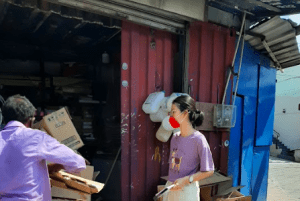On 10th Dec 2021, students in DP 1 Geography class went on a visit to the Pelawatte scrap center to get a better sense at how the recycled materials are being processed. To get the materials for this trip, we cleaned and organized the recycling room on campus in the previous class. We folded up cardboards, separated paper & plastic from other waste, and cleaned up the whole room. From the room, we collected four bags of scrap paper, cupboards and used books. The first bag was 7kg, the 2nd and the 3rd were both 13kg, and the 4th was 6kg. In total, we earned Rs.1170 from the four bags which were 39 kg, with an unit price of Rs.30/kg. We then asked some questions to gain insights on the career of recycling, and the current situation regarding sustainability. From the Q&A session, I was able to keep a record of the unit price of each kind of material accepted by the center:
(The price is usually not set, as it will increase or decrease based on the market price of these materials, and it is usually told by the scrap dealer himself. )

(Me asking questions about unit price to the scrap dealer) Photo taken by Thevuni
Plastic – Rs.40
Copper – Rs. 650
Aluminum – Rs. 100
Beer Can – Rs. 40
Big Battery – Rs.100
Small Battery – Rs.50
Book – Rs.10
One notable thing was that the scrap dealer was not happy with the tissue mixed with other materials in the bags, as he was picking the pieces out and we had to bring them all the way back to campus. We should definitely be more careful with the organization, so that we do not cause such inconveniences to others and ourselves.
According to the Waste Management Authority and the Central Environmental Authority, Sri Lanka generates 7000MT of solid waste per day, and Western Province accounts for nearly 60% of this generation. However, only half of the waste generated is collected. Globally, inefficient management of municipal solid waste has created serious negative impacts to both the environment and human, such as diseases, water pollution, and loss of biodiversity. However, I believe that with the increasing awareness of the presence of scrap centers, people will be more willing to collect their waste and recycle, and therefore contribute to both the environment and the economy.
Learning Outcome:
LO5: Demonstrate the skills and recognize the benefits of working collaboratively
LO6: Demonstrate engagement with issues of global significance